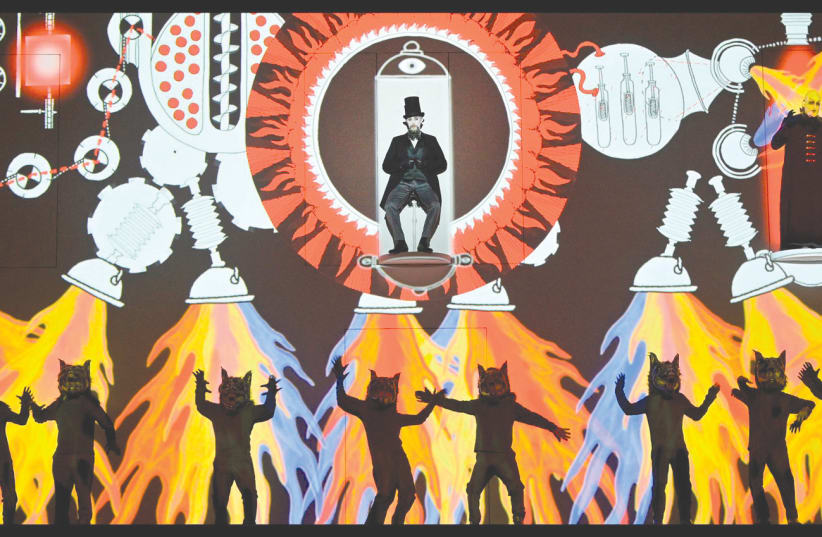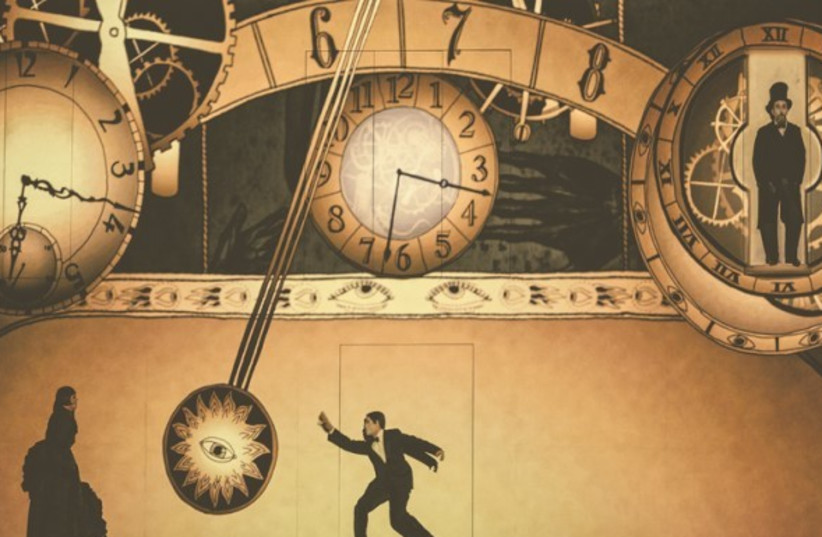A dark arachnid queen with huge legs who prevents her victims from fleeing, a bird-catcher in a yellow suit, a face painted green, mechanically animated elephants and a bearded wise man wearing a top hat seating underneath an all-seeing eye – these are but some of the elements that, together, make this new adaptation of Mozart’s The Magic Flute one of the most exciting, and talked about, productions of the Israeli Opera this season.
Jointly created by 1927 Concept, a production firm specializing in fusing animation and live theater, and the Komische Opera Berlin Artistic Director Barrie Kosky, this unique vision of the famous opera became a hit since it first opened in 2015. Following its success in China, the US, Poland, Japan and Australia – now Israeli opera lovers can enjoy it too.
The magic flute, which lends its name to the entire opera, is given to Tamino (Alasdair Kent) by the Queen of the Night (Eleonora Bellocci) so that he may save her daughter Pamina (Alla Vasilevitsky) from Sarastro (Taras Berezhansky). In this quest, Tamino is helped by Papageno (Theo Hoffman) who is also given magic bells for the same purpose. The two men will soon learn that the queen is far from honest in her dealings and will need to pass hardships before they find true love.
Since its first performance in 1791 cultural norms have changed a little and today’s audience might be surprised to hear Papageno introduce himself – with words penned by Emanuel Schikaneder more than two centuries ago – as a bird catcher who would like to catch some girls, put them in cages, and sell them for sugar [Der Vogelfänger bin ich ja].
THE ADAPTATION, which is highly entertaining and visually gorgeous, often winks at the audience. Papageno looks a lot like the protagonist of the 1994 film The Mask. A fitting reference for a production that puts together animation and live acting. As they are asked to pass various tests, Tamino and Papageno are given various medical shots. Whereas Tamino accepts them with obedience Papageno refuses, an odd case of art predicting the anti-vax movement.
Seeing as Sarastro intends to defeat the Night Queen with the power of male reason, one could take a subversive view of the opera. True, in this telling the Night Queen is destroyed like an evil boss on the final level of a computer game, but the power of music and emotions comes from her realm – not the mechanical one Tamino wishes to join.
The emotional height of the evening I attended was an awe-inspiring performance of “Der Hölle Rache kocht in meinem Herzen” [Hell’s vengeance boils in my heart] with soprano Eleonora Bellocci, who transformed into an awful insect-like mother which swears to her daughter that, unless Pamina murders in her name, the queen will destroy all the natural bonds between them. Bellocci was rewarded with a great round of applause by a grateful and knowledgeable audience.
Perhaps the audience is a little too knowledgeable. When a man behind me noticed me writing, he urged me to put in that “the audience that attends the premiers only does it to be shown, not for love of music.”
“This is not true,” a woman seated next to me exclaimed. “Though I feel ashamed on behalf of Mozart for what they did to him here,” she confessed.
“The video effects are wonderful in and of their own right, but I do not enjoy them. Mozart must be rolling in his grave.”
Her view, seeing as currently tickets are sold out and more performances were added to meet demand, seems to be in the minority.
The Israeli Opera had taken on a great project and brought to music lovers a chance to enjoy, right here at home, a crowd-pleasing adaptation to a much-beloved opera. The parents around me no doubt brought their young children with the expectation they would be able to relate to an opera in which love is depicted by a heart emoji, and hope it would prove to be a gateway opera – opening the door to more to come.
The Magic Flute will be shown on November 9 (Tuesday), and November 11 (Thursday) at 8 p.m. On November 12 (Friday) at 1 p.m. November 13 (Saturday) at 8 p.m. November 15 (Monday) at 6 p.m. November 16 (Tuesday) at 8 p.m. and November 17 (Wednesday) at 8 p.m. German with English and Hebrew subtitles. Tickets are between NIS 445 and NIS 395. The performance lasts for 2 hours, 45 minutes. I seriously suggest those suffering from arachnophobia not attend.
For more information: https://www.israel-opera.co.il/eng/ or call (03) 692-7777. The Israeli Opera is at 19 King Saul Boulevard, Tel Aviv. The audience is requested to present a Green Pass and wear a face mask to attend the performance.

